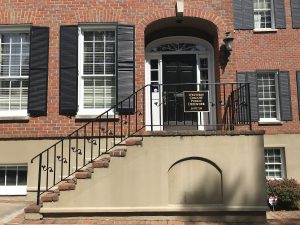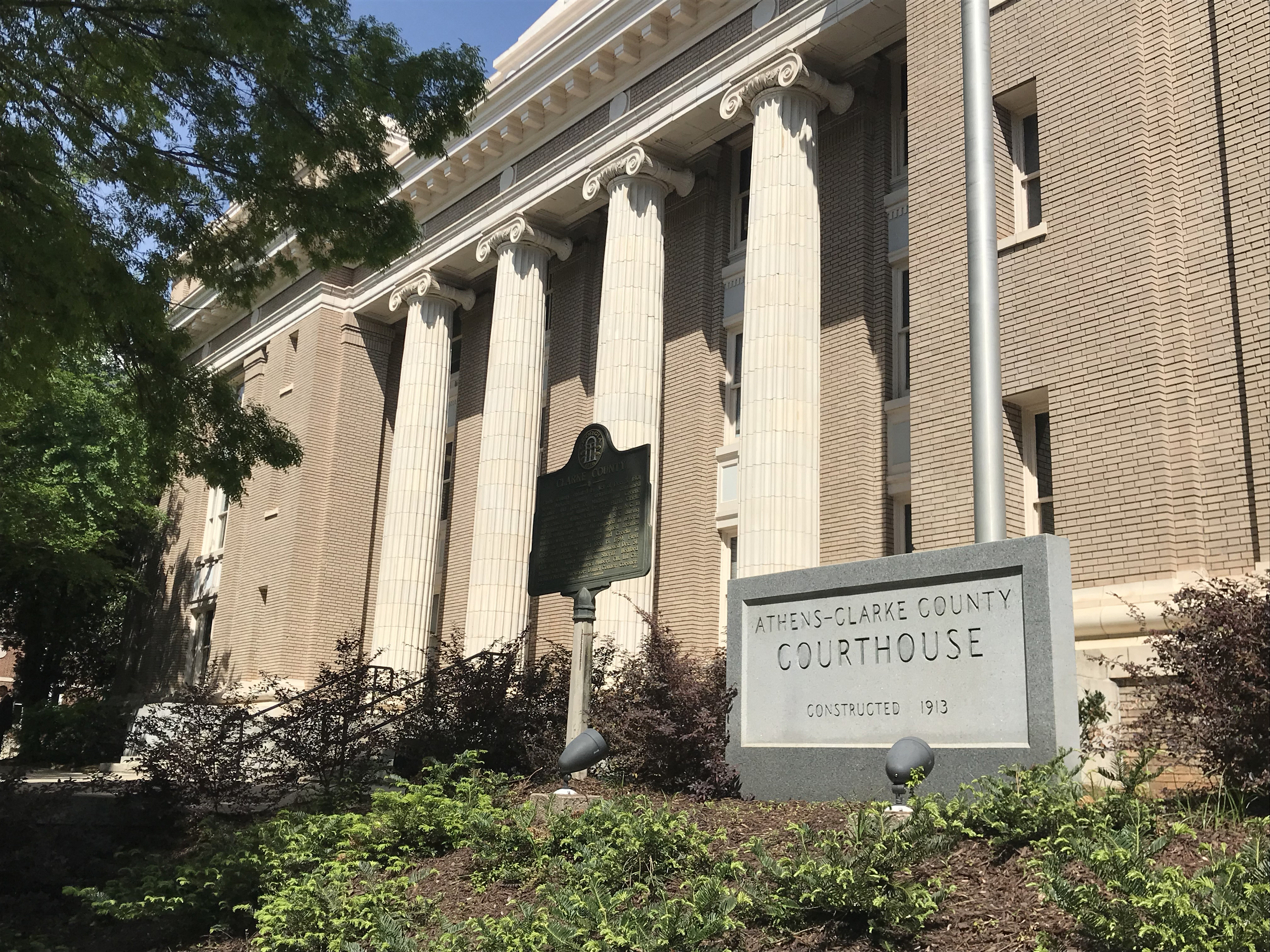Defendants, with their friends, family and attorneys, slowly filed into Judge Lawton Stephens’ courtroom in the Athens-Clarke County Courthouse for an arraignment on the morning of April 5, 2019. Low chatter filled the room as the crowd waited for Stephens to arrive, attorneys streaming in and out of the courtroom.
Once the arraignment began, defendants were called up one at a time to enter a plea. Because the arraignment is a very early step in the process, most defendants plead not guilty.
In attendance was Tyrese Edwards, a 21-year-old charged with one count of interference with government property and one count of theft by taking on Sept. 5, 2018. His hearing was set to be scheduled on June 19, 2019.
After his turn to plead, Edwards walked out of the courtroom with his mother. He said he has confidence in his public defender and is sure that he will get no jail time. Especially because there is “no evidence,” Edwards said.
An analysis of one month—March 2019—in the Athens-Clarke County Superior Court showed a notable disparity between numbers of defendants with public defenders and hired counsel whose outcomes included jail time. A high percentage of defendants with hired counsel plead themselves into jail.
Jail Time
Of those defendants on the docket for March who went to trial or struck a deal by April 8, 11 ended up with jail time. About 36% of them had a public defender and the other 63% had hired counsel.
To explain the disparity, Alan Cook, a clinical professor and the Prosecutorial Justice Program director at the University of Georgia Law School, noted that private counsel usually only get involved in cases where the charges are higher, something like vehicular homicide. With felonies of that degree, there is going to be some jail time. Adam Hebbard, a criminal defense attorney, agreed that it certainly could be attributed to the fact that those who choose to hire counsel have greater charges.
Whether or not an attorney considers that outcome successful depends on a number of conditions.
Cook was a Georgia prosecutor for the Alcovy Judicial Circuit for 10 years. From the prosecutor’s standpoint, the goal is to achieve a just result.
Dave Williams, an Athens-Clarke County public defender, Hebbard and Cook all said that from the defense attorney’s standpoint, success depends on the satisfaction of the client.
“What my client may want in a case, what my client may be entitled to or what my client may be eligible for varies widely from case to case,” said Hebbard. “There could be a wide variety of outcomes that could all be successful.”

For a charge like vehicular homicide, an attorney getting a 20-year jail sentence reduced by five years could certainly be considered successful.
It is also significant to note that 19 out of 33 defendants on the docket whose trials were completed before April 8 were charged with three or more offenses. Of those 19, eight were represented by hired attorneys and 11 by public defenders.
- Of those charged with three or more offenses who were represented by public defenders, 63% pleaded guilty to at least one charge, and 27% ended up with jail time (42% of those who pleaded guilty).
- Felony charges for those defendants primarily included possession of a controlled substance, marijuana, and cocaine. About 50% were convicted for drug charges while only 18% were violent crimes, like aggravated assault and cruelty to children.
- Of those who were represented by hired counsel, 62% pleaded guilty to at least one charge, and 62% ended up with jail time (100% of those who pleaded guilty).
Only one defendant of those with hired counsel was convicted for drug charges. The remaining were violent crimes, including sexual battery and aggravated assault, or other non-violent crimes, such as theft or computer forgery.
Hebbard used the word “interesting” repeatedly when observing the numbers, noticing the high percentage of defendants with hired counsel who plead themselves into jail.
One explanation Cook proposed is that most of the charges against defendants with public defenders were drug charges, which typically result in probation.
“Because the assigned counsel handle the vast majority of cases in the criminal justice system, incaraction is not the norm,” said Cook. “Probation is the norm for most criminal offenses, non-violent criminal offenses, non sex-crime cases.”

Continued Cases
Of the cases on the docket for the month of March, 65% of them were continued to a date later than April 8, 2019. According to Williams, there are many reasons why a case may need to be continued, including the mental health of the client or evidentiary matters.
Evidentiary matters include circumstances where the evidence might not be available to present at a hearing. For example, if the state has a key witness who left Athens-Clarke County and moved to California, the date will have to be postponed until the witness can get back to testify.
For hired counsel, the reason behind a continuance is most often scheduling conflicts between the various cases the attorney is juggling. According to Cook, it would be typical to see continuance granted more frequently with private counsel for this reason.
The difference between the two in Athens-Clarke County for March, however, was narrow. For cases with public defenders, 65% were continued. Sitting only slightly higher were the cases with hired counsel where 67% were continued, which surprised Hebbard.
“I think often cases where the public defender’s office is involved tend to move more quickly. There’s a number of reasons for that, one of them is that often they represent almost everyone who is incarcerated during the case. Those cases tend to move more quickly,” Hebbard said. “They also are in the courtroom and in front of the judge every day or several days a week at least. It’s interesting to me how that isn’t reflected in the [data] about how long these cases go on.”
The Transition
Prior to 2003, there was no statewide public defender system.
“Most jurisdictions the indigents were represented by local lawyers who were on a rotating assignment system,” said Cook. “You would have people doing contracts on Monday, divorces on Tuesday and then go into criminal court on Wednesday.”
Currently, the Athens-Clarke County system has 16 staff public defenders. Eight work in Superior Court, three in State Court, and the rest spread throughout Municipal, Juvenile, Probate or Magistrate Court.
The criminal systems assigns two public defenders to each Superior Court judge’s courtroom (Lott, Stephens, Norris, or Haggard). Each of the four judges has a docket for the month. The docket is then split in half: one attorney gets A-J and the other gets K-Z. Williams, for example, is assigned to Judge Norris’ courtroom and is assigned the first half of the alphabet, A-J.
Lawton Stephens, a judge of the Western Circuit, noted that prior to the system being implemented, defendants were represented in different ways, not all of them effective.
“Some of [the attorneys] didn’t have any experience doing criminal law and didn’t want to do it,” said Stephens.

He concluded that the best model is the public defender model, a system that mirrors the prosecution.
“You have people who get paid a salary and all they do is they are supposed to represent poor people in court in criminal cases,” said Stephens.
Cook agreed that the new system is much more efficient and allows defendants better access to a competent attorney.
“The public defender system has created an office of dedicated defense attorneys and I think it has professionalized the system and created better outcomes, frankly, for defendants because they do have well trained, career defense attorneys.”
From the March docket, Williams was initially assigned 16 cases, which isn’t unusual. He concluded eight of them before April 8. “I have been doing this a long time, so I’m able to manage my time well,” Williams said.

According to Williams, the Western Circuit is lucky. Home to a nationally ranked law school, the public defender’s office has access to plenty of interns and support from the education system. “In other circuits in Georgia, people are overwhelmed. I worked in Walton County for three and a half years, and I definitely felt overwhelmed there a lot,” said Williams.
The private attorneys recognize the public defenders’ good work too. Hebbard gave lots of praise to the public defenders of the Western Circuit.
Despite the heavy caseload and having no say in the cases he is assigned, Williams enjoys his job to the fullest. “I love this business, I love being a public defender. It is very fulfilling and I get to do a lot of good for a lot of people,” said Williams.
Emily Lanoue is a junior at the University of Georgia pursuing a bachelor’s degree in journalism with a minor in communication studies and a certificate in new media.







